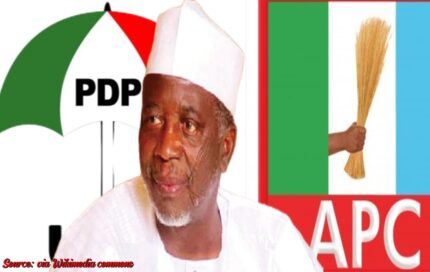Attahiru Bafarawa, the former governor of Sokoto State and a prominent figure in Nigerian politics, has formally announced his resignation from the Peoples Democratic Party (PDP). In a statement that has reverberated across the nation, Bafarawa cited dissatisfaction with the party’s leadership and its deviation from its founding principles as key reasons for his decision. Known for his influential role in Sokoto State politics, his departure marks a significant turning point for the PDP, particularly in the northern region.
Attahiru Bafarawa, who served as governor from 1999 to 2007, criticized the party’s lack of vision and internal unity. He expressed deep disappointment over what he described as the PDP’s abandonment of inclusivity and good governance. His resignation not only highlights growing tensions within the party but also raises questions about its ability to retain high-profile members and remain competitive on the national stage.
Attahiru Bafarawa’s Exit Alters Sokoto State’s Political Landscape
As a two-term governor with a track record of impactful governance, Attahiru Bafarawa’s resignation from the Peoples Democratic Party (PDP) signals a major shift in Sokoto State’s political framework. Known for his infrastructural achievements and commitment to people-centric policies during his tenure from 1999 to 2007, Bafarawa’s influence extends beyond party lines. His decision to leave the PDP has already stirred discussions among political stakeholders, with many considering its potential to disrupt the party’s dominance in the state.
Attahiru Bafarawa’s departure is expected to significantly weaken the PDP’s grassroots support in Sokoto and the broader northern region, where his leadership has historically galvanized voter loyalty. Analysts predict a realignment of political alliances as the PDP grapples with losing one of its key figures. This development could pave the way for rival parties, particularly the All Progressives Congress (APC), to strengthen their foothold in the region, setting the stage for heightened political competition ahead of the 2027 elections.
Reasons Behind the Resignation
Attahiru Bafarawa’s resignation is rooted in mounting frustrations with the PDP’s inability to resolve internal crises and address pressing national issues. In his statement, he lamented the lack of strategic leadership, which he claims has led to dwindling public confidence in the party.
The former governor also criticized the PDP’s approach to governance, highlighting its failure to articulate a clear vision for Nigeria’s future. He noted that these shortcomings have alienated key stakeholders and eroded the party’s ability to effectively challenge the ruling All Progressives Congress (APC).
Impact on Sokoto State Politics
Attahiru Bafarawa’s resignation could reshape the political landscape in Sokoto State, where his influence remains strong. The former governor has a loyal following, and his departure from the PDP may lead to a realignment of political alliances ahead of upcoming elections.
Political observers predict that Attahiru Bafarawa’s move could embolden opposition parties in the state, particularly the APC, which may seek to capitalize on the PDP’s potential vulnerabilities. This development adds a layer of uncertainty to Sokoto’s already competitive political environment.
Speculation Over Attahiru Bafarawa’s Next Move
Attahiru Bafarawa’s resignation has sparked speculation about his political future. While he has not announced plans to join another party, there are rumors of his possible alignment with the APC or the New Nigeria Peoples Party (NNPP). Both parties are reportedly courting him, given his political clout and experience.
If Attahiru Bafarawa decides to align with another political party, it could significantly impact the 2027 general elections. His track record and network of loyalists make him a valuable asset to any political organization seeking to strengthen its position in northern Nigeria.
Reactions from Political Stakeholders
The news of Attahiru Bafarawa’s resignation has elicited mixed reactions from political stakeholders. PDP officials expressed regret over his departure, with some calling for reconciliation efforts to address his grievances. However, opposition parties have welcomed the move, viewing it as an opportunity to attract disgruntled PDP members.
As Nigeria’s political landscape continues to evolve, Attahiru Bafarawa’s decision underscores the growing discontent among prominent politicians with the status quo. His resignation serves as a reminder of the need for political parties to prioritize internal unity and responsiveness to public concerns.
Table of Contents
Discover more from OGM News NG
Subscribe to get the latest posts sent to your email.














